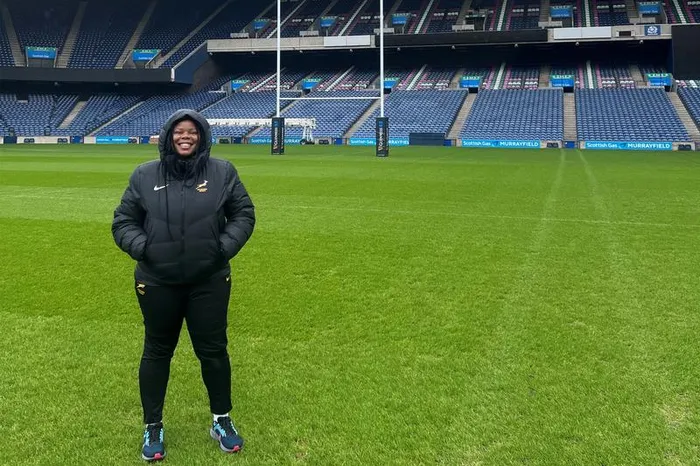How UCT's Thandiswa Nxomani became a pivotal figure in South African women's rugby

UCT student Thandiswa Nxomani.
Image: Supplied
Myolisi Gophe
When UCT student Thandiswa Nxomani first volunteered to manage the African Bombers amateur rugby club in the Eastern Cape, she thought she was simply filling a gap. The club needed a manager, and she stepped forward.
She didn’t realise that her decision would spark a new passion and set her on a path that would take her to the highest level of the game as team manager of the Springbok Women.
“I just realised I loved being in that space, making sure the players had what they needed, and keeping things running smoothly,” she said.
Earlier in August, Nxomani, who is studying for a postgraduate diploma in sport management at UCT, boarded a flight to England. This wasn’t just another tour. It was the biggest stage in women’s rugby, the World Cup. It was a full-circle moment for the 36-year-old from Peddie, Eastern Cape, who once tried her hand at playing before moving into administration.
“I love the players. I love the people I work with. That’s what keeps me going,” she said from camp in Northampton, where the Springbok Women are preparing to face Brazil, Italy and France in their Pool D matches.
Nxomani’s route into rugby was anything but direct. After high school, she studied at Nelson Mandela University and later joined the provincial Department of Sport, Recreation, Arts and Culture. A friend who was a Springbok player encouraged her to play, but she found the game too physically demanding at that stage.
“She kept saying, ‘Try it out, try it out,’” Nxomani recalled. “I did, but it wasn’t for me. By then, I was in my early twenties, already carrying sports injuries. So, I decided to step away from playing.”
Instead, she discovered her true calling in team management. She volunteered as manager at African Bombers, the same club that produced Springbok captain Siya Kolisi. From there, her career gathered momentum: first with Eastern Province Rugby’s women’s department, then as manager of the Junior Springbok Women under-20 team. By 2022, she managed the national Sevens side, accompanying them to the World Cup and Commonwealth Games. In 2023, she moved to her current role with the Springbok Women’s 15s team.
Being a team manager rarely makes headlines, but the role is essential to the success of any professional team.
“But most of the work happens long before we arrive at a tournament,” she explained. “In camp, it’s about making sure the day runs smoothly – transport to training, the right venues booked, gym slots confirmed. Even small things like which kit the players wear for the session.”
She oversees passports, visas, travel and accommodation, and helps manage the team’s well-being on tour. “We’re a team of 46 people – players, coaches, support staff – and you’re bound to have different personalities in one space. Homesickness is real, too. We spend weeks away from families. And with women, it can be even more complex. The challenge is making sure everyone feels supported, even when it’s not always possible to keep everyone happy,” she said.
Despite the challenges, she embraces the role. “Pressure is a privilege. It means people believe you can succeed.”
Carrying the green and gold brings expectations, especially in a rugby-mad country.
“Whenever you put on the green and gold jersey, there’s pressure. South Africans are passionate about rugby, and they expect results. But the context is different for women’s rugby. Most of our players only started the game quite late, and there are no professional leagues in South Africa yet. So, to expect us to win the World Cup is a bit unrealistic,” Nxomani said.
She is encouraged by recent progress. Professionalisation, she believes, is the next big step. “That’s when you’ll see the real gap close between us and the top-ranked nations.”
Alongside rugby, Nxomani is continuing her education through UCT. “It’s all online, which helps a lot. UCT has also given me some time off to focus on the World Cup, which I appreciate. Right now, my studies are on pause, but I’ll pick them up again when we return.”
She sees her studies as an investment in her future and hopes to bring her academic insights back into the sport after the tournament.
Asked what advice she has for young women in rugby, Nxomani was clear: “Work hard. Ask questions. Build your contacts in rugby. And never stop learning about the game. That’s the best advice I can give.”
As the Springbok Women take the field at the World Cup, Nxomani will remain behind the scenes, ensuring everything runs smoothly.
“Managing a team isn’t always easy,” she said with a smile during the virtual interview. “But seeing the growth, seeing the passion of the players, it makes every sacrifice worthwhile.”
Cape Times